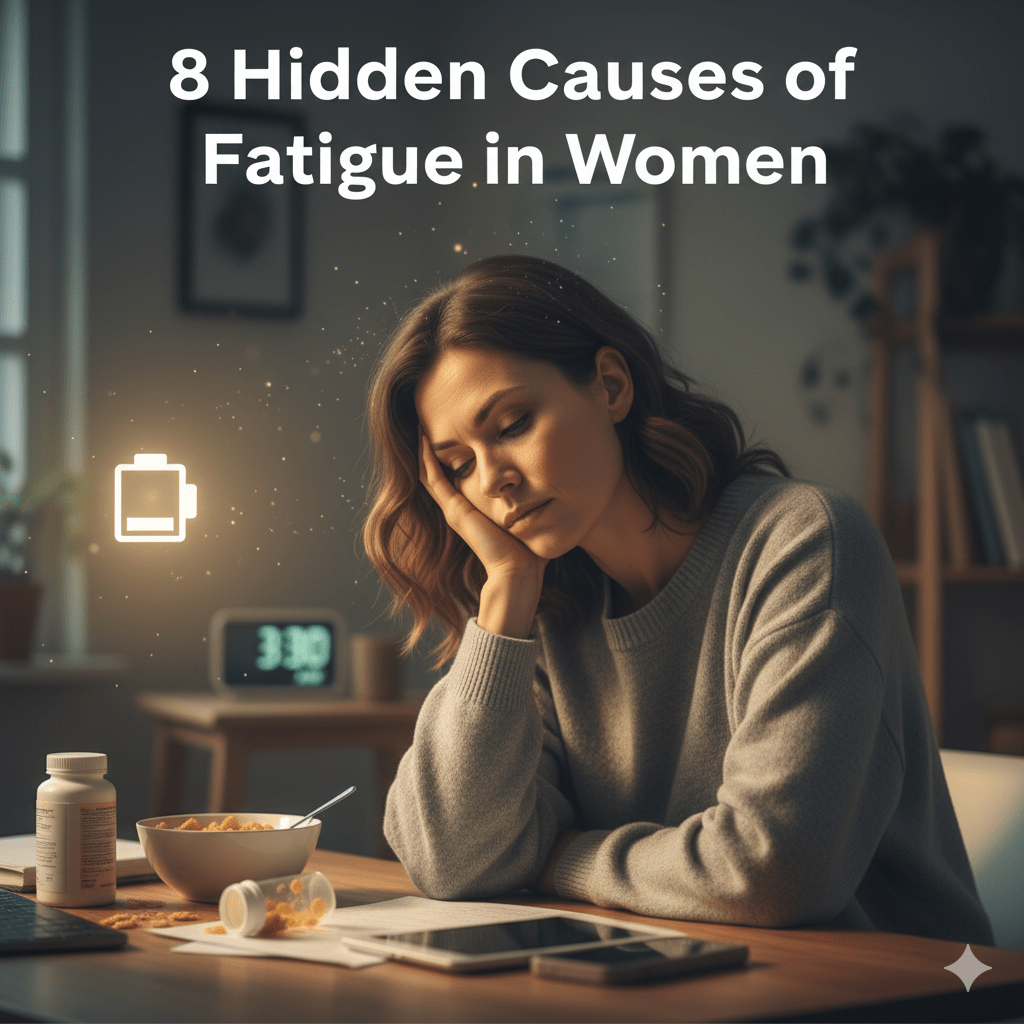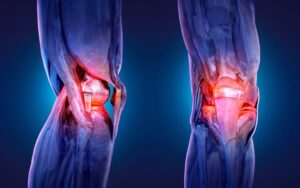
8 Hidden Causes of Fatigue in Women
Fatigue is more than just feeling tired after a long day. For many women, it’s an overwhelming sense of exhaustion that doesn’t go away even after a full night’s rest. If you constantly feel drained, struggle to focus, or find yourself losing motivation, there might be more to it than just being busy. Sometimes, fatigue is your body’s way of signaling that something deeper is going on.
Let’s explore the hidden causes of fatigue in women, why they often go unnoticed, and how you can start feeling energized again.
1. Iron Deficiency (Anemia): The Silent Energy Killer
Iron deficiency is one of the most common hidden causes of fatigue in women. It happens when your body doesn’t have enough iron to produce hemoglobin, the protein in red blood cells that carries oxygen throughout your body. Without enough oxygen, your muscles and tissues don’t get the energy they need, leaving you feeling weak and tired.
Women are more prone to iron deficiency due to menstruation, pregnancy, or poor dietary intake. Signs can include dizziness, shortness of breath, pale skin, brittle nails, and cold hands or feet.
What helps:
Include iron-rich foods such as lean meats, spinach, lentils, and beans in your diet. Also, combine these with vitamin C-rich foods like oranges or bell peppers to enhance iron absorption. If symptoms persist, a simple blood test can confirm if you have anemia.
2. Thyroid Imbalance: When Your Hormones Slow You Down
Your thyroid gland plays a crucial role in controlling metabolism, the process that converts food into energy. When your thyroid is underactive (a condition called hypothyroidism), your metabolism slows down, leading to fatigue, weight gain, dry skin, and even depression.
This condition is especially common among women over 30. Because symptoms develop slowly, many women mistake them for normal signs of aging or stress.
What helps:
If you suspect thyroid issues, consult your doctor for a thyroid function test. If diagnosed, treatment with thyroid hormone replacement can restore balance and energy levels.
3. Vitamin Deficiencies: A Hidden Drain on Energy
Even if you eat well, you could still be missing key vitamins that affect energy levels. Deficiencies in vitamin B12, vitamin D, and magnesium are particularly linked to chronic fatigue.
- Vitamin B12: Essential for nerve health and red blood cell production. Low levels can cause fatigue, weakness, and tingling in the hands or feet.
- Vitamin D: Plays a role in mood and energy regulation. Lack of sunlight or a poor diet can cause a deficiency.
- Magnesium: Helps convert food into energy and supports muscle function. Low magnesium can cause tiredness and muscle cramps.
What helps:
Ask your healthcare provider for a blood test to check your vitamin levels. Supplements or dietary changes, such as eating eggs, fish, whole grains, and green vegetables, can make a big difference.
4. Chronic Stress and Burnout: Emotional Exhaustion That Feels Physical
Modern life demands a lot from women, juggling careers, family, and personal responsibilities can take a toll. Chronic stress doesn’t just affect your mind; it also impacts your body by increasing levels of cortisol, the “stress hormone.”
Over time, high cortisol levels can disrupt sleep, weaken immunity, and cause hormonal imbalances, all of which lead to fatigue.
What helps:
Prioritize self-care and rest. Even simple habits like short walks, deep breathing, journaling, or spending time in nature can lower stress. Also, try to maintain a healthy work-life balance and seek professional support if burnout feels overwhelming.
5. Poor Sleep Quality: The Rest That Isn’t Restful
You might be spending enough time in bed, but still waking up tired. Poor sleep quality can be caused by stress, caffeine, late-night screen use, or medical conditions like sleep apnea.
Sleep apnea, where breathing repeatedly stops during sleep, is more common in women than previously believed. It can cause morning headaches, irritability, and severe fatigue during the day.
What helps:
Create a bedtime routine that promotes relaxation. Limit caffeine after noon, avoid screens an hour before bed, and keep your bedroom cool and dark. If you still feel tired after a full night’s rest, talk to your doctor about possible sleep disorders.
6. Hormonal Fluctuations: The Monthly Energy Rollercoaster
Hormonal changes during menstruation, pregnancy, and menopause can significantly affect energy levels. Drops in estrogen and progesterone can lead to fatigue, mood swings, and brain fog. For some women, premenstrual syndrome (PMS) or perimenopause can cause weeks of low energy and poor sleep.
What helps:
Eating a balanced diet, exercising regularly, and maintaining hydration can help stabilize hormones. Some women also find relief through herbal supplements or hormone therapy — but these should always be discussed with a doctor.
7. Hidden Infections or Chronic Conditions
Sometimes, fatigue is a symptom of underlying infections or long-term illnesses that aren’t immediately obvious. Conditions like urinary tract infections (UTIs), autoimmune diseases, or chronic fatigue syndrome (CFS) can sap your energy without showing clear symptoms at first.
What helps:
If your fatigue lasts more than a few weeks and doesn’t improve with rest, it’s important to get a full medical evaluation. Blood tests, urine analysis, and other diagnostic checks can help identify hidden issues.
8. Mental Health: The Overlooked Cause of Fatigue
Depression and anxiety don’t just affect mood they also drain physical energy. Women struggling with mental health challenges often describe waking up tired, no matter how much they sleep.
What helps:
Don’t ignore the emotional side of fatigue. Talking to a mental health professional can provide valuable strategies and support. Lifestyle changes like meditation, exercise, and social connection also play a big role in recovery.
Final Thoughts
Fatigue in women isn’t always about overwork sometimes it’s your body’s way of saying something isn’t right. Whether it’s a nutritional deficiency, hormone imbalance, or emotional exhaustion, identifying the root cause is the first step to feeling better.
View test pricing at Rahila Research & Reference Lab
Start by paying attention to your symptoms and getting the right medical tests. With small lifestyle changes, proper nutrition, and professional guidance, you can restore your energy and feel like yourself again, strong, focused, and ready to take on life.



